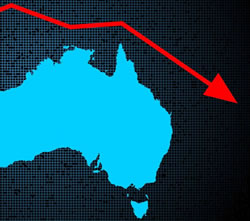Samantha Menzies* says the 2020 recession is unlike any other before it and job losses will reflect this.
 Nearly all industries and workers feel the pinch in times of recession, but some jobs are far more vulnerable than others during times of crisis.
Nearly all industries and workers feel the pinch in times of recession, but some jobs are far more vulnerable than others during times of crisis.
The 2020 recession is even more unique in that it coincides with mass global economic devastation which comes as a result of the coronavirus.
Generally in times of recession, Aussies limit spending and businesses tighten their purse strings which unsurprisingly affects jobs in many non-essential industries.
But what is unique about the current coronavirus recession is that we are also seeing an accelerated loss of employment in industries with workers in routine manual jobs and sectors which struggle to operate with new social distancing measures.
Here Yahoo Finance has compiled a list of eight most at-risk jobs during the 2020 coronavirus recession.
Recession 2020: Eight jobs most at risk of being made obsolete
Anything that can be automated
Routine manual jobs such as factory workers, retail workers and even drivers are especially at risk during the current recession.
Many businesses, especially those which were already looking into artificial intelligence, are ramping up automation in response to new social distancing measures, reduced spending and/or higher volume.
If a robot can do the job quicker, cheaper and more accurately then it’s at risk.
Travel and tourism jobs
During a usual recession people tend to travel on a tighter budget, or postpone travel plans altogether.
Take that one step further in the coronavirus and due to heavy travel restrictions both interstate and overseas, we could see costly travel agents and even many tourism-related businesses become a thing of the past forever.
Entertainment workers
Similarly to the travel and tourism industry, the entertainment industry has been ravaged by the coronavirus pandemic.
Safety measures such as social distancing, enhanced cleaning and restrictions on movement and group gatherings has put a halt to nearly all entertainment-related business and with it, the jobs.
Restaurants and hospitality workers
Sadly another industry where mass workers have lost their jobs and the coronavirus pandemic continues to hit workers hard.
Many restaurants have had to close their doors, several unable to recover from the financial loss.
Even those that do, thanks to restricted numbers and social distancing, are struggling to cover costs and stay afloat.
Exploration and mining jobs
In June, IBIS World released a new report which stated that the coronavirus recession will have a ‘very high’ impact on Australia’s exploration and mining.
The research firm cites supply disruptions and lower demand as the key influencers with operators and Australian firms likely to significantly reduce capital expenditure and delay investment in new projects, also presenting a major threat to workers.
Transportation and warehousing jobs
Also on IBIS World’s list of industries which will suffer a ‘very high’ impact from the 2020 recession is transportation and warehousing.
With global trade expected to contract, Australia’s domestic freight task and freight operators will have a steep downturn in demand, with many facing job losses.
Construction workers
Supply chain issues, tight budgets and social distancing measures will put a stop to many construction projects.
While government stimulus is expected to keep the construction industry going for the near-future, “as generous government stimulus policies are relaxed and the reality of a prolonged recovery sets in, construction is expected to weather a heavy business-cycle shock”, a recent Mckinsey report explains.
The coronavirus pandemic comes at a challenging time for the sector which was already forecast to suffer a decline during 2020 thanks to households becoming more reluctant to spend on construction.
Real estate jobs
It’s unsurprising that real estate workers make the list of at-risk jobs given the industry is expected to suffer a near-term decline in both its commercial and residential areas due to widespread job losses and reduced cash flow, making many real estate jobs redundant in the process.
*Samantha Menzies is a Contributing editor at Yahoo Finance.
This article first appeared at au.finance.yahoo.com











